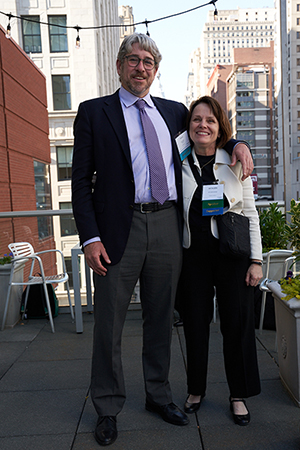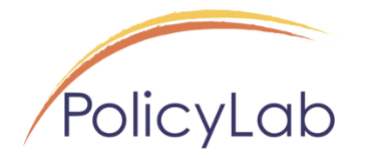The Making & Legacy of PolicyLab: A Q&A with Our Co-founders
It’s a significant time of transition here at PolicyLab as we celebrate with our long-time director and co-founder, Dr. David Rubin, as he embarks on his next adventure and mark the start of a new chapter for our center.
Given that, and the fact that it’s PolicyLab’s 15th anniversary, I thought it would be fun to take a trip down memory lane with both of our co-founders—Dr. Rubin and Kathleen Noonan, now president and CEO of the Camden Coalition, a strong partner of PolicyLab’s—to memorialize PolicyLab’s history and recognize its legacy. I asked them to reflect on the past and on the foundation that existed to make PolicyLab the impactful interdisciplinary center it is today. Their responses made me even more excited for the future of PolicyLab and what we can achieve in the years to come—enjoy!
Kathleen, what brought the two of you together to form PolicyLab back in 2008?
Ronnie Bloom, who was then at the William Penn Foundation and now runs the Stoneleigh Foundation, introduced us in 2007.

William Penn was funding a study of Dave’s about children in child welfare and whether placement with kin resulted in more stability for children and earlier reunification with families. Dave asked me to be on the advisory board for the study, though I am not sure it was that formal. We ended up mostly having 1:1 lunch meetings, during which we discussed the disconnect between research and policy and vice versa. Dave was frustrated that his research (and that of others) did not influence program or policy change, and I was frustrated that policymakers were not engaged by researchers about issues that were important to them.
We decided we had to be able to do better and started dreaming up a research center at Children’s Hospital of Philadelphia (CHOP) that was focused on influencing real-world problems for children, families, program providers and policymakers.
Dave, what did the PolicyLab team look like when you first put it together?
When PolicyLab started, it was really a coalition of the willing. The center was a handful of physician-scientists whose work had a specific focus on the community and how conditions and challenges outside of the hospital impact children’s health.
It was clear to us at that point that in order to have a new model emerge, we would only be successful if we recruited others to the cause who had different, interdisciplinary perspectives and could help us in the journey of translating our work into meaningful programs and policies. That’s when we started recruiting individuals with expertise in communications, policy, public health, social work, and psychology, among other specialties. And that’s why Kathleen joining as co-founder and co-director was so important: it sent a clear message that this center was going to be different.
Dave, what was PolicyLab’s identity early on, and how has that evolved?

Early on, PolicyLab had much more of an academic model in which our focus was on supporting physician-scientists who were developing their careers and achieving academic merits like peer-reviewed publications and grant awards. And while that goal has not changed—we still strive to the career development of our researchers—our focus has evolved in a direction of supporting research interpretation and positioning the strong evidence our researchers are creating to have meaningful, lasting impacts for families and the communities in which they live.
Kathleen, was there an early moment of success that showed you how impactful this unique model could be?
YES! We were working to identify policy champions in Washington, D.C. who might be interested in our work so we could establish new information distribution channels and more timely, more relevant research questions when we were asked by one such group, First Focus, to produce a report on the effect of the 2008-2009 recession on child well-being that could be used for congressional briefings.
It was not a request for a peer-reviewed research study that would take several years to complete, but a synthesis of what was known from the literature so far. The report needed to be done in about three months and paid about 10% of what a project might typically cost. But we said yes, because we knew this was the kind of work we had to do to have credibility with policymakers and to show the impact of this type of short-term project.
It paid off—the report was featured in at least two congressional staff briefings that fall, which included PolicyLab researchers and policy staff (Dave, me and others), and First Focus used it for their advocacy agenda. We all saw the return on investment; we decided we wouldn’t only do research like this, but we would incorporate stakeholder-requested projects into our portfolio to have time-sensitive, relevant, necessary information for program administrators and policymakers.
Dave, what different areas of research expertise has the center cultivated over the years, and how has that set the center apart?
Even as we have focused on policy work and the strategic impacts we can have in the community, we have continually emphasized that what sets PolicyLab apart is both our experience caring for children at CHOP and the rigor of our research and methods. That led us to concentrate on developing strong biostatistical quantitative and qualitative research supports, which allow us to not only characterize trends families are experiencing but why we observe these trends and what might help us improve the lives of families as the result of our work.
These investments have broadened the capabilities of a growing research team and accelerated the success of early career researchers.
Kathleen, what sets PolicyLab apart from other research centers with similar goals?
The difference is that PolicyLab has invested from the start in policy and communications staff who are focused outside the academic environment to accomplish broader change.
PolicyLab researchers, like researchers in other academic research centers, are focused on peer-reviewed, gold-standard studies published in prestigious academic journals. However, PolicyLab has never measured its success by research publications. The center’s policy and communications staff work alongside researchers to translate their findings to broader audiences and, when appropriate, to bring them and/or their findings to the statehouse or a city council hearing, for example.
But the non-researchers at PolicyLab are not just the ensemble; they are often the lead with the researchers playing a supporting role. This is an important part of the formula at PolicyLab and something that sets it apart. I have met many researchers who say they do policy work, but they really don’t. They care about policy issues, but they have no expertise themselves in how to get a new law passed or advocate for a state Medicaid Plan amendment. PolicyLab researchers know that policy change takes expertise, and that policy goals often take many more years to accomplish than the span of a single research project.
At PolicyLab, the researchers and the policy and communications teams work jointly to leverage research findings for real-world policy and program change.
Dave, what has been the biggest surprise to you about PolicyLab over the last 15 years?
The biggest surprise to me—and one of the greatest rewards of doing this—has been the joy I’ve gotten out of watching PolicyLab team members, including faculty, move on to really impactful roles elsewhere. I’ve always said that one of the greatest legacies we have is not the work we do while at the center, but what happens afterwards and how we impart our theory of change as we venture on to other roles. That is the true legacy of the center.
Kathleen, can you share a fond memory from the early years?
It was very hard getting the center off the ground during the first two years—we didn’t have a lot of funding, and we felt a lot of pressure to prove our value not just externally but within CHOP, as the issues we worked on (child welfare, reproductive health) were not necessarily organizational priorities. Dave and I also both had little kids at home, so we needed some type of work-life balance. I remember a time we didn’t agree on something—who knows what it was—so we planned a call after our kids’ bedtimes and ended up not resolving the issue, even after talking about it again.
I was a bit concerned a few days later when we still hadn’t spoken about our disagreement, and wondered if it had bigger ramifications for our co-directing. So, I asked Dave, “do you think we need to talk about our call the other night?” And, classic Dave said, “Yeah, I think we need to agree to never talk after 8pm ever again.” And I said, “done.” And we never did, at least not about work.
We had seven successful years as co-directors, and I have been an advisor to him and others at PolicyLab since then. The right answer is so often to keep your eye on the bigger goal, and we have.
